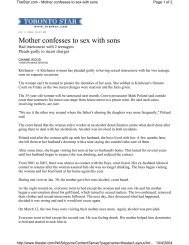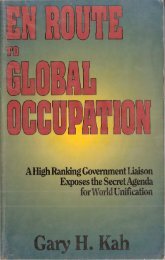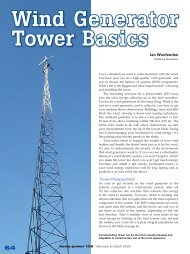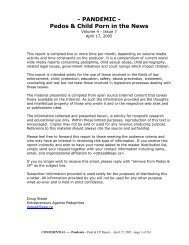G. Edward Griffin - The Fearful Master - PDF Archive
G. Edward Griffin - The Fearful Master - PDF Archive
G. Edward Griffin - The Fearful Master - PDF Archive
You also want an ePaper? Increase the reach of your titles
YUMPU automatically turns print PDFs into web optimized ePapers that Google loves.
lind "killing and wounding--even in the hospitals." He stated that since the United States<br />
had continued to finance and support this carnage he was returning with disgust the<br />
Medal of Freedom awarded to him by the United States in 1946. 17<br />
That same day, December 14, a full-page advertisement was run in the New York Times<br />
protesting the bombing of Katanga, which had "committed no aggression except wanting<br />
to be free of a Communist-controlled central government." <strong>The</strong> State Department replied<br />
by accusing the sponsors of the ad of taking bribes from the Katanga Information Service<br />
in New York. 18 Adlai Stevenson said further: "<strong>The</strong> object of the United States in supporting<br />
the United Nations during this long and trying period has been to advance American policy<br />
in Africa. . . . It seems to me that our policy and UN policy have coincided exactly in the<br />
Congo. I wish many Americans would think of that when they complain about what has<br />
been done there." 19<br />
And so it went. <strong>The</strong> great and powerful United Nations--the "last best hope for peace," the<br />
"moral conscience of the world"--pitted against tiny Katanga, a country that would not give<br />
up. Again and again, Katanga held firm. Finally another cease-fire was called.<br />
Almost a year went by while the United Nations went through the motions of conciliation<br />
and pondered its next move. Matters were complicated by the Congo war lasting longer<br />
and costing far more than expected. It put the United Nations into debt. A further financial<br />
complication arose when Soviet Russia refused to pay its share of the cost. This, of<br />
course, made it appear as if the Communists were really quite unhappy over the UN<br />
Congo policy. <strong>The</strong>y knew full well, however, that their friends in Washington would put up<br />
enough "dirty capitalist" money to cover the whole operation. <strong>The</strong>y were right, as was<br />
proved by subsequent events.<br />
<strong>The</strong> American taxpayer was simply told that the Congo operation was anti-Communist<br />
while he was being relieved of several hundred million more dollars. 20<br />
On October 12, 1962, the American Committee for Aid to Katanga Freedom Fighters<br />
revealed a highly confidential memorandum which had been circulated among top United<br />
Nations officials. <strong>The</strong> memorandum put forth a very precise and intricate timetable for<br />
renewed military aggression against Katanga. It also predicted that the United States<br />
would go along with these plans in spite of rising public opposition at the grass roots. It<br />
declared:<br />
<strong>The</strong> U.S. will judge itself bound, as in the past, by UN decisions and will<br />
supply the necessary transport aircraft and, later on, helicopters. . . .<br />
Washington would like to work out a compromise; but the State<br />
Department has based its policy on the UN and will in no circumstances<br />
disregard its obligations to the UN decision.<br />
United Nations officials and State Department spokesmen immediately charged that the<br />
memorandum was fictitious. Events since then, however, have proved that it was one<br />
hundred percent accurate, even to the timetable.<br />
Suddenly, the UN released a press report describing a letter said to have been signed by<br />
eight important tribal chiefs in Katanga. <strong>The</strong> letter branded Tshombe as a traitor, asked for<br />
his immediate arrest, demanded that troops be sent to crush Tshombe's resistance, and<br />
highly praised the United Nations. While most newsmen took the report at face value,<br />
Michael Padev of the daily Arizona Republic thought that the whole matter seemed too


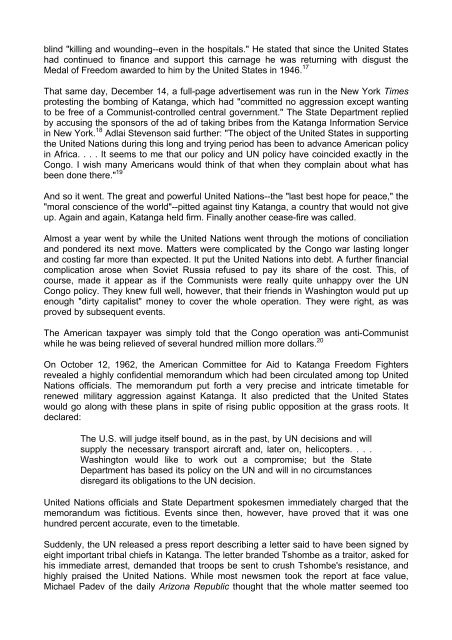
![Robert T McQuaid [rtmq@stn.net] Sent: Friday, October 29, 2004 12 ...](https://img.yumpu.com/51070071/1/190x245/robert-t-mcquaid-rtmqstnnet-sent-friday-october-29-2004-12-.jpg?quality=85)



